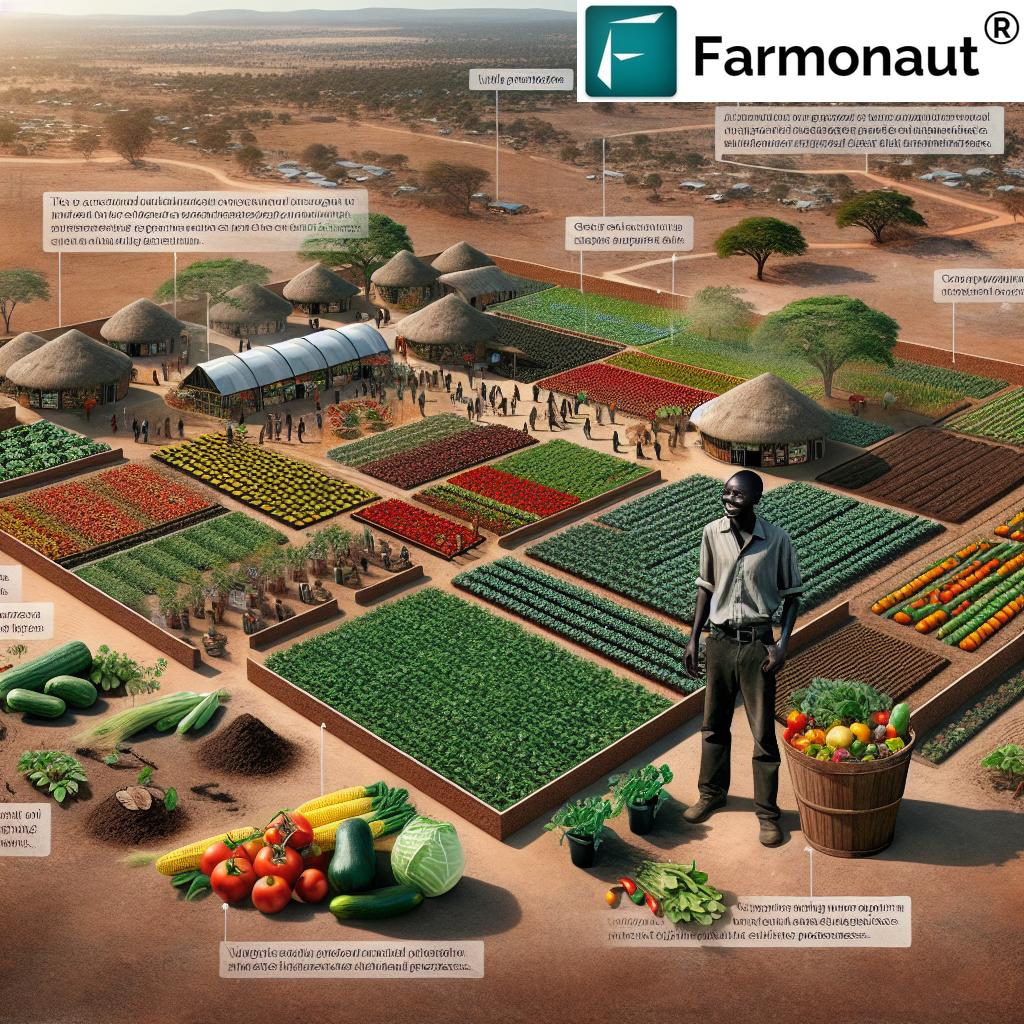From Unemployment to Farming Success: How Young Zimbabweans Are Transforming Agriculture in the Midlands Province
“Young Zimbabwean farmers in the Midlands province have successfully diversified into 5 different crops and 2 livestock types.”

In the heart of Zimbabwe’s Midlands province, a remarkable transformation is taking place. Young farmers are turning the tide of unemployment and breathing new life into the agricultural sector. We’ve witnessed firsthand how these determined individuals are not just cultivating crops, but growing dreams and harvesting hope for an entire generation.
Today, we’ll explore the inspiring journey of one such farmer, Arthur L. Chitogo, whose story epitomizes the Zimbabwe farming success stories that are emerging across the region. From the challenges of unemployment to the triumph of managing a thriving, diversified farm, Arthur’s experience offers valuable insights and motivation for aspiring farmers everywhere.
The Seeds of Change: Young Farmers in Midlands Province
The Midlands province, known for its harsh climate and challenging agricultural conditions, might seem an unlikely place for a farming revolution. Yet, it’s precisely here that young farmers in Midlands province are defying the odds and rewriting the narrative of Zimbabwe’s agricultural future.
- Embracing innovation in the face of adversity
- Leveraging technology to overcome environmental challenges
- Building resilient farming practices for sustainable growth
These young farmers are not just working the land; they’re working smarter, utilizing innovative farming methods for harsh climates to turn barren fields into bountiful harvests.
Arthur’s Journey: From Job Seeker to Job Creator
Arthur’s story begins like many others in Zimbabwe – a young graduate facing the harsh reality of unemployment. But where others saw despair, Arthur saw opportunity in the soil beneath his feet.
“One farmer’s journey from unemployment to managing a thriving farm showcases a 100% turnaround in personal economic status.”
| Stage | Challenges | Actions Taken | Outcomes |
|---|---|---|---|
| Unemployment | Limited job opportunities, economic instability | Researched agricultural opportunities, attended Zimbabwe Farmers Union programs | Gained knowledge and skills in farming |
| Starting Small | Limited resources, lack of experience | Started with small plots, focused on high-demand crops | Established initial crop production, learned practical skills |
| Diversification | Market fluctuations, climate uncertainties | Expanded into multiple crops and livestock | Increased income stability, reduced risk |
| Sustainable Success | Scaling operations, maintaining quality | Implemented sustainable practices, invested in technology | Thriving farm business, employment creation |
Arthur’s journey from job seeker to successful farmer is a testament to the power of perseverance and the potential of agriculture in Zimbabwe. Let’s delve deeper into the strategies and techniques that transformed his life and could inspire countless others.
Cultivating Success: Horticultural Crop Cultivation Techniques
At the heart of Arthur’s success lies his mastery of horticultural crop cultivation techniques tailored for the unique challenges of the Midlands province. We’ve seen how his approach to farming goes beyond traditional methods, incorporating modern science and local wisdom.
- Crop Selection: Focusing on resilient, high-demand crops like potatoes, tomatoes, cabbages, and lettuce
- Water Management: Implementing efficient irrigation systems to combat water scarcity
- Soil Health: Utilizing organic farming practices to improve soil fertility and structure
- Pest Control: Adopting integrated pest management techniques to protect crops sustainably
These techniques not only improved crop yields but also ensured the long-term sustainability of Arthur’s farming operations.
In the video above, you can see how satellite technology, like that offered by Farmonaut, is revolutionizing land use in agriculture. This type of innovation is crucial for farmers like Arthur who are looking to optimize their operations.
Small-Scale Agriculture in Zimbabwe: Big Impact, Small Footprint
Small-scale agriculture in Zimbabwe is proving to be a powerful force for economic change and food security. Arthur’s farm, while modest in size, demonstrates the outsized impact that well-managed small farms can have:
- Efficient use of limited land resources
- Higher productivity per hectare compared to larger farms
- Greater crop diversity, enhancing market resilience
- Improved food security for local communities
By focusing on intensive cultivation methods and crop selection suited to local conditions, small-scale farmers like Arthur are maximizing their output and profitability.
Diversifying Farm Income Streams: A Recipe for Resilience
One of the key lessons from Arthur’s success is the importance of diversifying farm income streams. We’ve observed how this strategy has shielded his business from market fluctuations and climate uncertainties.
- Crop Diversification: Growing a mix of seasonal and year-round crops
- Livestock Integration: Adding poultry and goat breeding to the farm’s portfolio
- Value-Added Products: Processing and packaging farm produce for higher market value
- Agro-tourism: Offering farm tours and educational experiences
This multi-faceted approach not only stabilizes income but also creates multiple touchpoints with the market, enhancing the farm’s overall resilience.

Agricultural Entrepreneurship Opportunities: Sowing the Seeds of Business
Arthur’s journey highlights the vast agricultural entrepreneurship opportunities available in Zimbabwe. The transition from farmer to agripreneur involves:
- Identifying market gaps and consumer needs
- Developing a solid business plan and financial strategy
- Building networks with other farmers, suppliers, and buyers
- Continuously innovating and adapting to market trends
These entrepreneurial skills, combined with agricultural knowledge, create a powerful formula for success in the farming sector.
Sustainable Farming Practices in Africa: A Green Revolution
Arthur’s commitment to sustainable farming practices in Africa is not just good for the environment; it’s good for business. We’ve seen how these practices contribute to long-term farm viability:
- Crop rotation to maintain soil health
- Minimal tillage to prevent soil erosion
- Natural pest control methods to reduce chemical use
- Water conservation techniques to maximize resource efficiency
By adopting these practices, Arthur ensures that his farm remains productive for years to come, setting a standard for sustainable agriculture in the region.
The video above showcases Farmonaut’s advanced crop monitoring and yield prediction capabilities. These tools can be invaluable for farmers like Arthur who are looking to optimize their crop management and increase yields sustainably.
Agribusiness Management Strategies: From Field to Market
Effective agribusiness management strategies have been crucial to Arthur’s success. We’ve identified several key areas where his approach stands out:
- Financial Management: Careful budgeting and reinvestment of profits
- Marketing: Building strong relationships with local markets and exploring export opportunities
- Human Resources: Training and empowering local workers, creating employment in the community
- Technology Adoption: Leveraging modern tools for farm management and market analysis
These strategies have transformed Arthur’s farm from a small operation into a thriving agribusiness.
Zimbabwe Farmers Union Programs: Nurturing Agricultural Growth
The role of the Zimbabwe Farmers Union programs in supporting young farmers like Arthur cannot be overstated. These programs provide:
- Training in modern farming techniques
- Access to market information and networking opportunities
- Advocacy for policies that support small-scale farmers
- Resources for financial management and business development
By participating in these programs, Arthur gained not just knowledge, but also a supportive community of fellow farmers and agricultural experts.
Innovative Farming Methods for Harsh Climates: Adapting to Challenges
The Midlands province’s harsh climate demands innovative farming methods for harsh climates. Arthur’s success is partly due to his adoption of climate-smart agriculture techniques:
- Drought-resistant crop varieties
- Rainwater harvesting and efficient irrigation systems
- Greenhouse cultivation for sensitive crops
- Agroforestry to improve soil quality and provide shade
These methods not only help mitigate the effects of harsh weather but also contribute to more consistent yields year-round.
The video above demonstrates how Farmonaut is making farming better with satellite data. This technology can be particularly beneficial for farmers in harsh climates, providing crucial insights for optimal crop management.
The Role of Technology in Modern Farming
In today’s agricultural landscape, technology plays a pivotal role in enhancing productivity and sustainability. Farmers like Arthur are increasingly turning to advanced tools to optimize their operations. One such tool that’s making waves in the industry is Farmonaut.
Farmonaut offers satellite-based farm management solutions that can revolutionize how farmers monitor and manage their crops. With features like real-time crop health monitoring and AI-based advisory systems, it’s an invaluable asset for modern farmers.
- Real-time crop health monitoring
- AI-powered advisory for optimal farm management
- Weather forecasting for better planning
- Resource management tools for efficiency
By leveraging such technologies, farmers can make data-driven decisions, leading to improved yields and more sustainable practices.
Explore Farmonaut’s offerings:
Lessons from the Field: Advice for Aspiring Farmers
Drawing from Arthur’s experience, we’ve compiled some key advice for aspiring farmers:
- Start Small: Begin with manageable plots and expand gradually
- Continuous Learning: Stay updated with the latest farming techniques and market trends
- Network: Build relationships with other farmers, suppliers, and buyers
- Embrace Technology: Utilize modern tools and data to inform your farming decisions
- Diversify: Don’t put all your eggs in one basket – diversify your crops and income streams
- Sustainability: Adopt practices that ensure long-term productivity of your land
Remember, success in farming doesn’t happen overnight. It requires patience, perseverance, and a willingness to adapt.
The video above provides insights into large-scale field mapping and satellite-based farm monitoring using Farmonaut. This knowledge can be incredibly valuable for farmers looking to scale up their operations efficiently.
The Future of Farming in Zimbabwe
As we look to the future, the story of young farmers like Arthur gives us hope for the agricultural sector in Zimbabwe. With the right mix of traditional knowledge, modern techniques, and technological support, the country’s farming industry is poised for growth.
- Increasing adoption of sustainable farming practices
- Growing interest in agri-entrepreneurship among youth
- Potential for Zimbabwe to become a regional agricultural powerhouse
- Opportunities for value addition and agro-processing
The success of these young farmers is not just transforming individual lives but has the potential to revitalize entire communities and boost the national economy.
Conclusion: Harvesting Hope for the Future
Arthur’s journey from unemployment to successful farmer is more than just a personal triumph; it’s a beacon of hope for young Zimbabweans and aspiring farmers across Africa. It demonstrates that with determination, innovation, and the right support, agriculture can be a viable and rewarding career path.
As we’ve seen, the key ingredients for success include:
- Embracing innovative farming methods
- Diversifying crops and income streams
- Adopting sustainable practices
- Leveraging technology and data-driven insights
- Continuous learning and adaptation
The transformation of agriculture in the Midlands province is a testament to the resilience and ingenuity of Zimbabwe’s young farmers. As they continue to grow and innovate, they’re not just cultivating crops – they’re cultivating a brighter future for their communities and their country.
For those inspired by Arthur’s story and looking to start their own farming journey, remember that success in agriculture is a marathon, not a sprint. Start small, dream big, and don’t be afraid to leverage modern tools and technologies to give your farm the best chance of success.
The future of farming in Zimbabwe is bright, and it’s being shaped by the hands of its young, innovative farmers. As we continue to support and celebrate these agricultural entrepreneurs, we’re not just investing in farms – we’re investing in the future of a nation.
FAQ Section
Q: How can young Zimbabweans get started in farming?
A: Start by attending training programs offered by organizations like the Zimbabwe Farmers Union. Begin with a small plot, focus on high-demand crops, and gradually expand as you gain experience and capital.
Q: What are some of the main challenges for young farmers in Zimbabwe?
A: Key challenges include access to land and capital, unpredictable weather patterns, market fluctuations, and the need for modern farming knowledge and technology.
Q: How important is crop diversification for small-scale farmers?
A: Crop diversification is crucial. It helps mitigate risks associated with market fluctuations and climate variability, ensuring a more stable income throughout the year.
Q: What role does technology play in modern farming in Zimbabwe?
A: Technology is increasingly important, offering tools for precise crop monitoring, efficient resource management, and access to market information. Platforms like Farmonaut provide valuable insights for better farm management.
Q: How can farmers in harsh climates improve their yields?
A: Farmers can improve yields by using drought-resistant crops, implementing efficient irrigation systems, practicing soil conservation, and leveraging technology for precise crop management.






